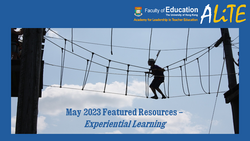ALiTE May Resources - Experiential Learning
Others
Date
May 01 - 31, 2023 (Mon-Wed)

While we have the capacity to grow and learn in our lifetime, meaningful learning occurs when we are exposed to experiences (Miettinen, 2000; Morris, 2020). Drawing on prominent scholarship on human learning and development (Kolb & Kolb, 2005), experiential learning (EL) is a process that hinges on the idea that learners, as active participants, develop knowledge, skills, and attitudes through directly, consciously, and iteratively engaging in and critically reflecting on experience (Coker et al., 2017; Morris, 2020). Grounded in John Dewey’s conceptualisation of learning as a social and contextualised process of knowledge construction (Miettinen, 2000), EL requires learners’ authentic inquiry to real-world problems, exposing them to novel, challenging yet empowering and practical experiences (Morris, 2020). In relation to real-life practices in society, EL is also characterised by collaborative participation in social activities, whereby learners play a responsive role and sometimes take collective responsibility over the learning process (Williams & Sembiante, 2022).
Different from traditional pedagogies where knowledge is transmitted to learners, EL entails that knowledge is created through contextually rich experience (Lee, 2019). Among the various models of EL (e.g., Kolb & Kolb, 2005), critical reflection in the EL process often serves as a defining feature that facilitates EL (Harfitt & Chow, 2018; Morris, 2020). The learning outcomes of EL vary from one programme to another, though the stimulation of both intellectual and socioemotional experiences can help students develop both hard skills and soft skills (Coker et al., 2017).
EL was first developed for adult education and management training (Miettinen, 2000), but has since been used in many different educational settings. EL has been used in traditional classroom settings for disciplinary (Chan, 2012) as well as interdisciplinary studies (Chiu, 2019). Outdoor education also embraces EL through field trips and other informal learning institutions (e.g., museums) (Harfitt & Chow, 2018; Goff et al., 2018). In tertiary education, EL is often implemented through internships, service learning programmes, immersion and foreign exchange programmes, and undergraduate research experiences (Coker et al., 2017). These various contexts illustrate how EL can be adapted to meet different teaching and learning needs.
In particular, there is also a pool of studies in teacher education (Harfitt & Chow, 2018), focusing on teaching practicum as an EL component for pre-service teachers to gain field-based experience in pedagogical applications and classroom practices (Lee, 2019). Extant studies have also particularly called for more attention and efforts on how educators can be trained to improve their competence in facilitating EL (Morris, 2020).
Recent advancement in digital technologies and the pandemic-induced challenges have inspired and motivated technology-supported/enhanced delivery of students’ EL experience. For instance, immersive reality technologies (e.g., virtual reality, augmented reality) have been increasingly leveraged to offer learners the opportunities to participate in simulation-based experiential learning in a virtual and immersive way (Goff et al., 2018).
The Academy for Leadership in Teacher Education (ALiTE) has curated a list of resources for educators, researchers and the general public who are interested in education-related information and tools, including internet resources and scholarly contributions. The topic for May is “Experiential Learning”. Check out the curated resources at https://www.alite.edu.hku.hk/post/experiential-learning and remember to bookmark it!
#hkueducation #teachersofig #teachereducation #ALiTE #experientiallearning
